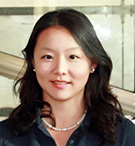
Yue Guan
Deep-Sea Brine Pool Research
yue.guan@kaust.edu.sa
Originally from the beautiful city of Qingdao located on the shores of the Yellow Sea in China, Yue Guan is a Ph.D. student in Bioscience. Before joining KAUST, Guan completed dual master’s programs at Università della Calabria and China Pharmaceutical University.
At KAUST, Guan’s research focuses on the deep-sea brine pools of the Red Sea under the supervision of Professor Ulrich Stingl, the lead PI of the SEDCO Research Excellence Award winning project. Her part of the project is a collaborative effort with Professor James G. Ferry at Penn State.
“I see KAUST as an adventurous, inspirational, international and entrepreneurial research institution. It has partners globally in academia and industry,” said Guan.
One of the things she likes about KAUST is that the University provides unique and outstanding research and development opportunities to graduate students. “Studying at KAUST has been a journey of discovery into science as well as a journey of rediscovery into myself. While earning my Ph.D. degree, my life at KAUST has been enriched with so many wonderful experiences,” Guan said.
Guan is fascinated by extremophiles and how they cope with harsh environments. She is currently investigating microbial diversity in the deep-sea anoxic brine pools of the Red Sea, with a focus on methanogenic archaea. What excites her about these environments is that they are some of the most extreme and remote environments on Earth. She also worked on projects related to Arabidopsis and wheat response to osmotic stress in labs at KAUST and Oxford before taking part in the deep-sea brine project.
“I am working on cultivation and genomic investigation of halophilic anaerobic microorganisms from such environments. Through studying their distinctive genomic and physiological traits, I hope to unravel their metabolisms, functional adaptations, and their contributions to the hypersaline environment in the Red Sea,” Guan said.
When asked about her most memorable scientific experience, Guan says she has had many. “KAUST has made it possible for female students to work in the field, exploring the Red Sea. It was an incredible experience for me to work together with other scientists on a research vessel under conditions both physically and technically challenging. During the KAUST Red Sea Expedition, we sampled brines located at depths around two kilometers with increased temperatures and astonishing salinities. We obtained data and samples that our group and collaborators could work on for several years,” she said.
In the future, Guan would like to continue working on exploring life forms that thrive in the most inhospitable conditions to understand how they survive. She would like to apply her discoveries to biotechnological, industrial, environmental and medical concerns.
When not in the lab or office, Guan can be found SCUBA diving or performing in various musical activities on campus. “I am a member of the KAUST Community Orchestra and Chorus. I am also engaged in teaching music to children in the community,” she said.
At KAUST, Guan’s research focuses on the deep-sea brine pools of the Red Sea under the supervision of Professor Ulrich Stingl, the lead PI of the SEDCO Research Excellence Award winning project. Her part of the project is a collaborative effort with Professor James G. Ferry at Penn State.
“I see KAUST as an adventurous, inspirational, international and entrepreneurial research institution. It has partners globally in academia and industry,” said Guan.
One of the things she likes about KAUST is that the University provides unique and outstanding research and development opportunities to graduate students. “Studying at KAUST has been a journey of discovery into science as well as a journey of rediscovery into myself. While earning my Ph.D. degree, my life at KAUST has been enriched with so many wonderful experiences,” Guan said.
Guan is fascinated by extremophiles and how they cope with harsh environments. She is currently investigating microbial diversity in the deep-sea anoxic brine pools of the Red Sea, with a focus on methanogenic archaea. What excites her about these environments is that they are some of the most extreme and remote environments on Earth. She also worked on projects related to Arabidopsis and wheat response to osmotic stress in labs at KAUST and Oxford before taking part in the deep-sea brine project.
“I am working on cultivation and genomic investigation of halophilic anaerobic microorganisms from such environments. Through studying their distinctive genomic and physiological traits, I hope to unravel their metabolisms, functional adaptations, and their contributions to the hypersaline environment in the Red Sea,” Guan said.
When asked about her most memorable scientific experience, Guan says she has had many. “KAUST has made it possible for female students to work in the field, exploring the Red Sea. It was an incredible experience for me to work together with other scientists on a research vessel under conditions both physically and technically challenging. During the KAUST Red Sea Expedition, we sampled brines located at depths around two kilometers with increased temperatures and astonishing salinities. We obtained data and samples that our group and collaborators could work on for several years,” she said.
In the future, Guan would like to continue working on exploring life forms that thrive in the most inhospitable conditions to understand how they survive. She would like to apply her discoveries to biotechnological, industrial, environmental and medical concerns.
When not in the lab or office, Guan can be found SCUBA diving or performing in various musical activities on campus. “I am a member of the KAUST Community Orchestra and Chorus. I am also engaged in teaching music to children in the community,” she said.

